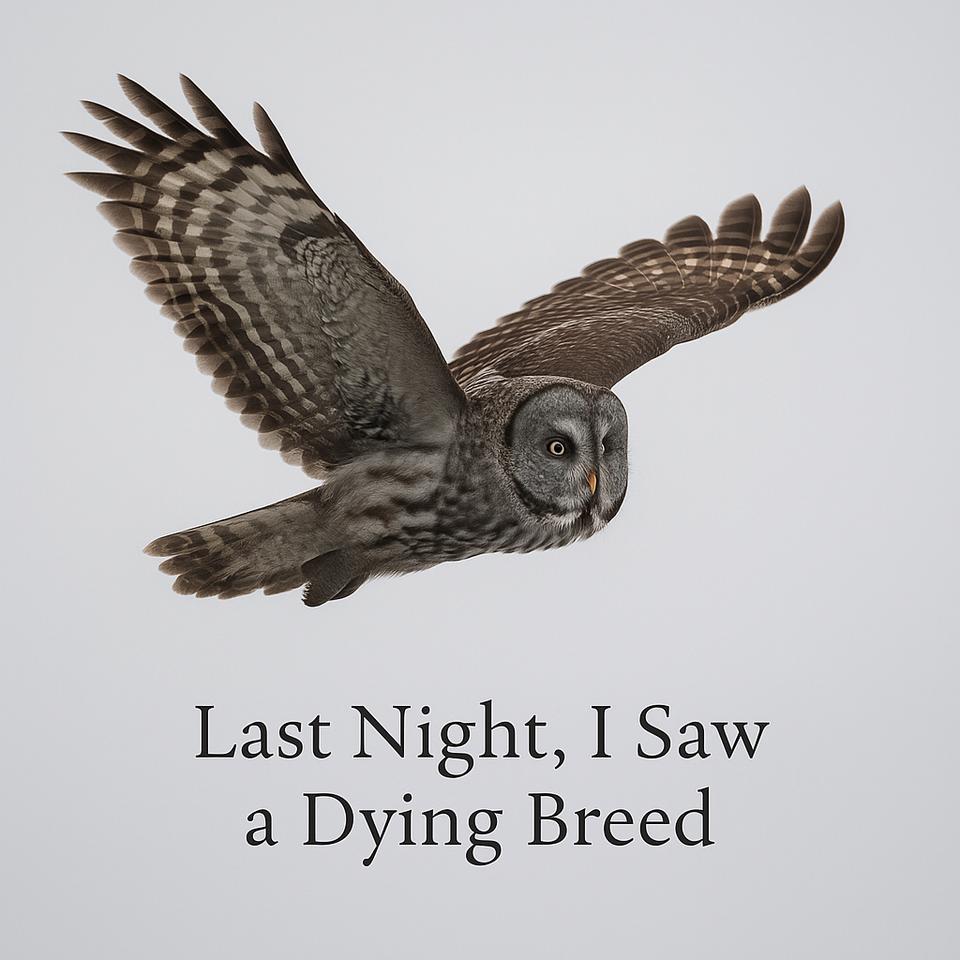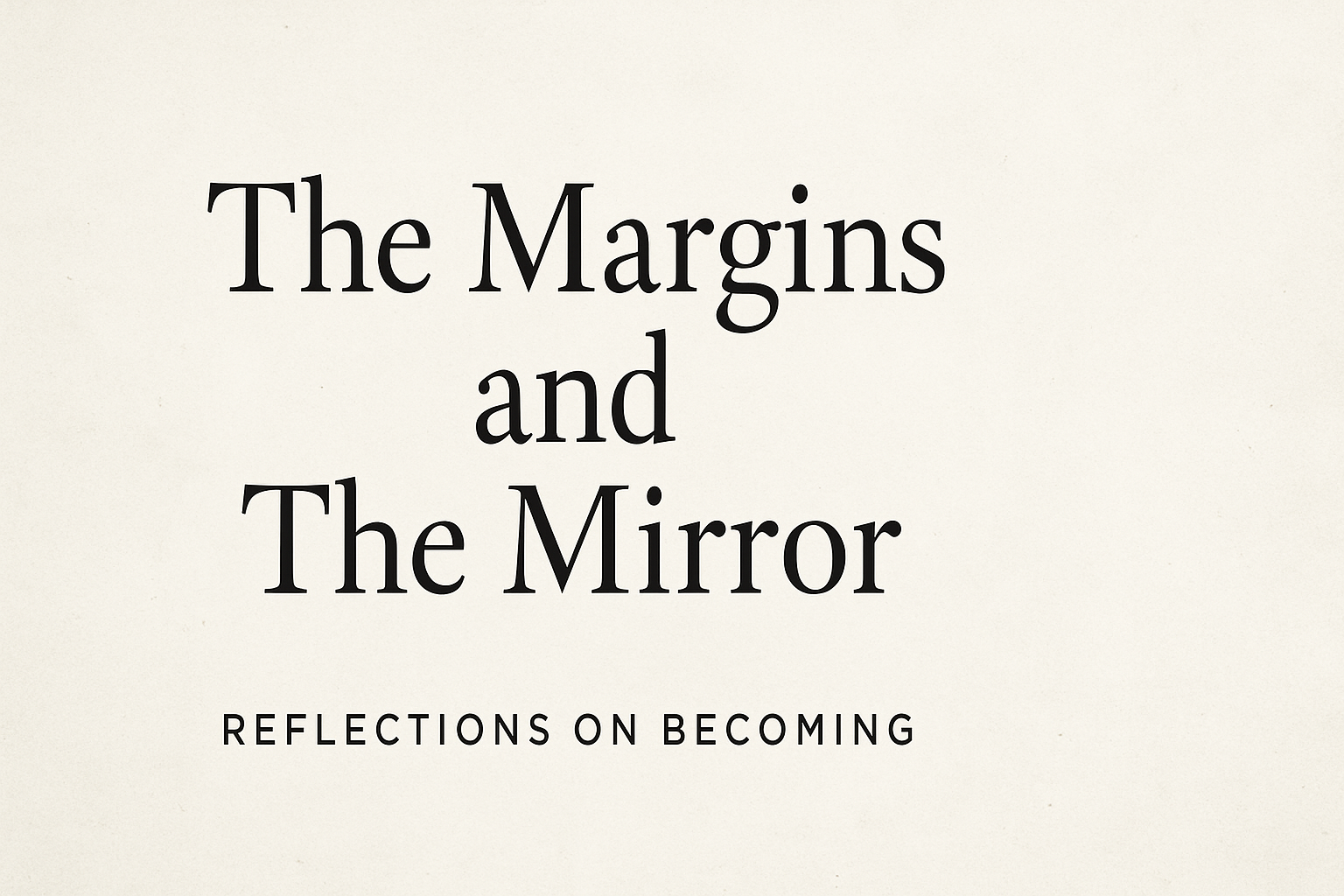Last Night, I Saw a Dying Breed

What Scott Pelley reminded us about courage, truth, and the crumbling Fourth Estate.
A rare great grey owl — a silent witness to a vanishing world.
“Last night, I saw the rarest of birds — once thriving, but now, sadly, nearly extinct.”
— Robin Emmons
The slow and torturous death of journalism — and with it, true journalistic integrity — has become one of the greatest threats to American democracy.
This collapse didn’t happen overnight. It was a steady erosion — of standards, of neutrality, of courage. Now, in the shadow of Donald Trump’s second (though non-consecutive) term, the free press finds itself bloodied and gasping, barely able to stand in a landscape built to tear it down.
Once, we looked to journalism to speak truth to power. Today, we have networks branded by party affiliation — CNN and MSNBC playing to liberal audiences, Fox News a mouthpiece for the Right. Even this labeling is evidence of decay. News shouldn’t be partisan. But what we now call “news” is often a performance of opinion.
Anchors and media personalities like Rachel Maddow, Joy Reid, and Don Lemon on the left — and Tucker Carlson, Mike O’Reilly, Megyn Kelly, and Pete Hegseth, now controversially installed as Secretary of Defense, on the right — have all played their part in the erosion of fact-based journalism.
The blurring of news, commentary, and political loyalty has accelerated the decay of a press once considered a guardian of democracy.
But this didn’t happen in a vacuum.
It was engineered.
Rupert Murdoch, long the master of ceremonies in this theater of media partisanship, built an empire by fueling division, distrust, and spectacle.
Now Jeff Bezos — owner of The Washington Post — has quietly begun to retreat from the fight, capitulating to political pressure to avoid drawing the ire of a president who punishes truth like it’s treason.
Gone are the days when the public could rely on broad, fact-based reporting that spanned issues of war, science, health, education, and democracy itself.
What remains is a battlefield:
- A president bent on vengeance, targeting 60 Minutes, NPR, PBS — any outlet that dares to speak without his script.
- Corporations that cannibalized newsrooms, trading journalism for quarterly profits.
- And a weary group of journalists still trying, against all odds, to report what matters while under siege.
Some of the loudest voices — those who came to embody their networks’ partisan leanings — are no longer in those anchor chairs. Either they left their networks, or their networks left them. But make no mistake: their departure wasn’t a cleansing. It was a calculation.
And they didn’t disappear.
They rebranded.
Many resurfaced on YouTube channels, subscription platforms, and podcasts — untethered from journalistic oversight, but not from influence.
Broadcasting from living rooms and dining room tables, they continued beating the drum of personal and political bias, reaching millions in curated digital echo chambers. Their messages are louder now, slicker, and more dangerous — because they’re packaged as authenticity.
To an unsuspecting public, it may feel like insight.
But what many are consuming is one version of a much larger truth — rehearsed, repackaged, and weaponized.
And yet — every so often — there’s a rare sighting.
An endangered act of journalistic courage.
Scott Pelley’s closing remarks on 60 Minutes’ April 27, 2025 broadcast were one of them.
In an era where executives act as monarchs, handing down editorial decrees shaped by corporate greed and political alignment, Pelley’s refusal to bend was a moment of steely grace.
He didn’t just report. He resisted.
60 Minutes first aired in 1968 — the year I was born.
For decades, it would become for me what journalism was supposed to be: a source of insight, integrity, and principled storytelling.
Every Sunday, one hour of grounded, fact-based inquiry — delivered without drama, but with moral weight.
Last night, I watched what may have been the final breath of a breed once common in our media landscape.
Like Edward R. Murrow before him, Pelley stood not just as a reporter, but as a witness.
It is my sincere hope that his farewell was not a harbinger of extinction — but a reminder that some still choose truth over comfort, and service over spectacle.
And as I watch the steady unraveling of our press, I can’t help but think of the reprisal of Edward R. Murrow in Good Night, and Good Luck — George Clooney’s haunting Broadway homage.
The portrayal feels eerily fictional and mournfully nostalgic, as if we’re watching not just a dramatization of the past, but a prophecy for the present.
Murrow once warned us that a nation of passive viewers, fed only what comforts or confirms, would be easy prey for tyranny.
We should’ve listened.
We still can.
Because in the end, when journalism dies, so does democracy.
We still have a choice.
We can tune out the noise. We can stop, think, and ask ourselves the most important question: Is this true?
We can challenge our assumptions, fact-check the narratives we’re fed, and seek out sources committed to truth — not just tribe.
Because a free press is only as strong as the people willing to defend it.
And if democracy is worth saving, then so is the truth.
If this reflection resonated with you, I invite you to join me at
The Margins and The Mirror — a space for deeper conversations about democracy, culture, and becoming.
New essays, reflections, and rare dispatches — direct to your inbox.
✍️ Subscribe to The Margins and The Mirror today.
→ Subscribe Here
#MarginsAndTheMirror #RobinWrites2025

